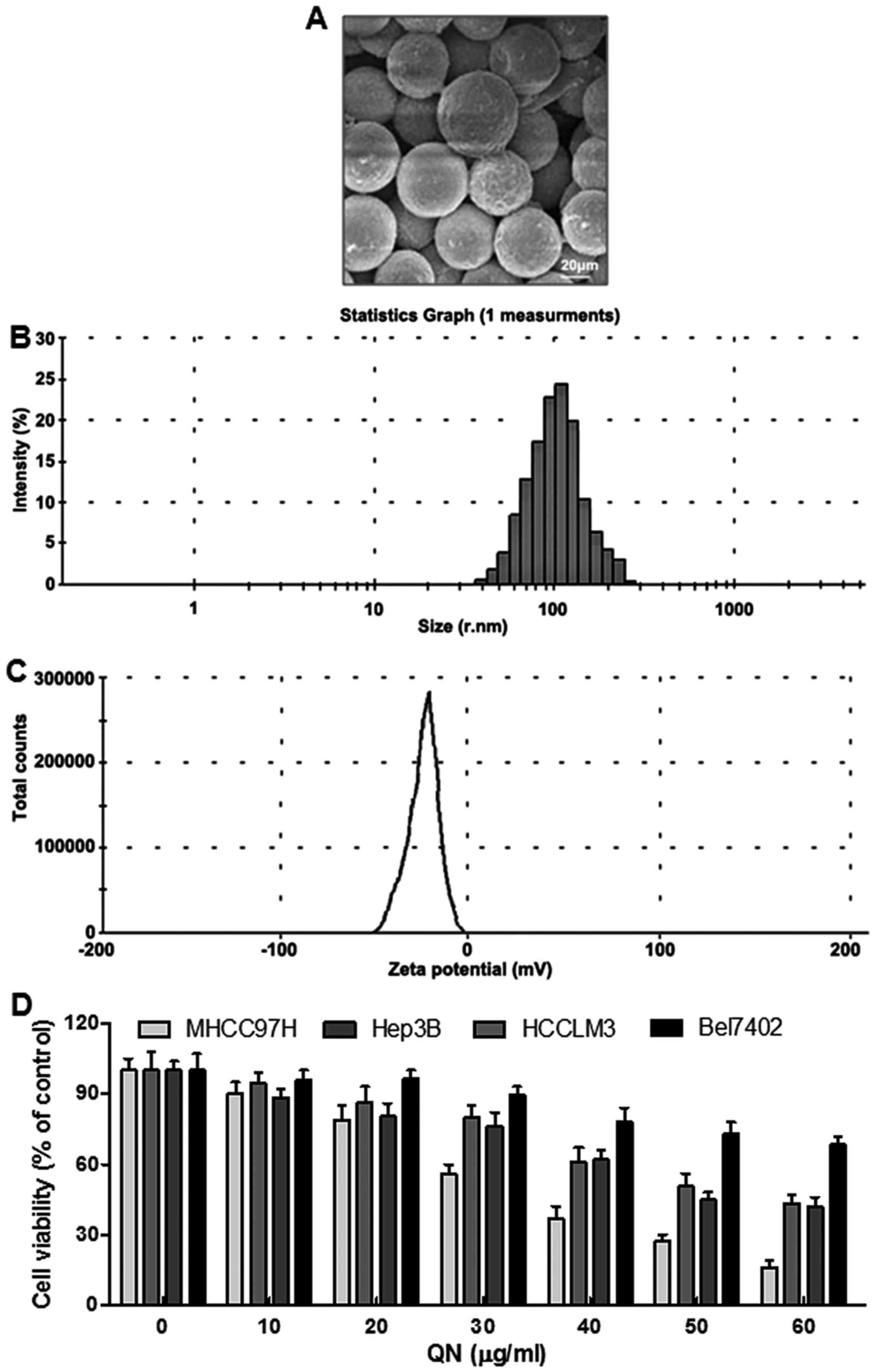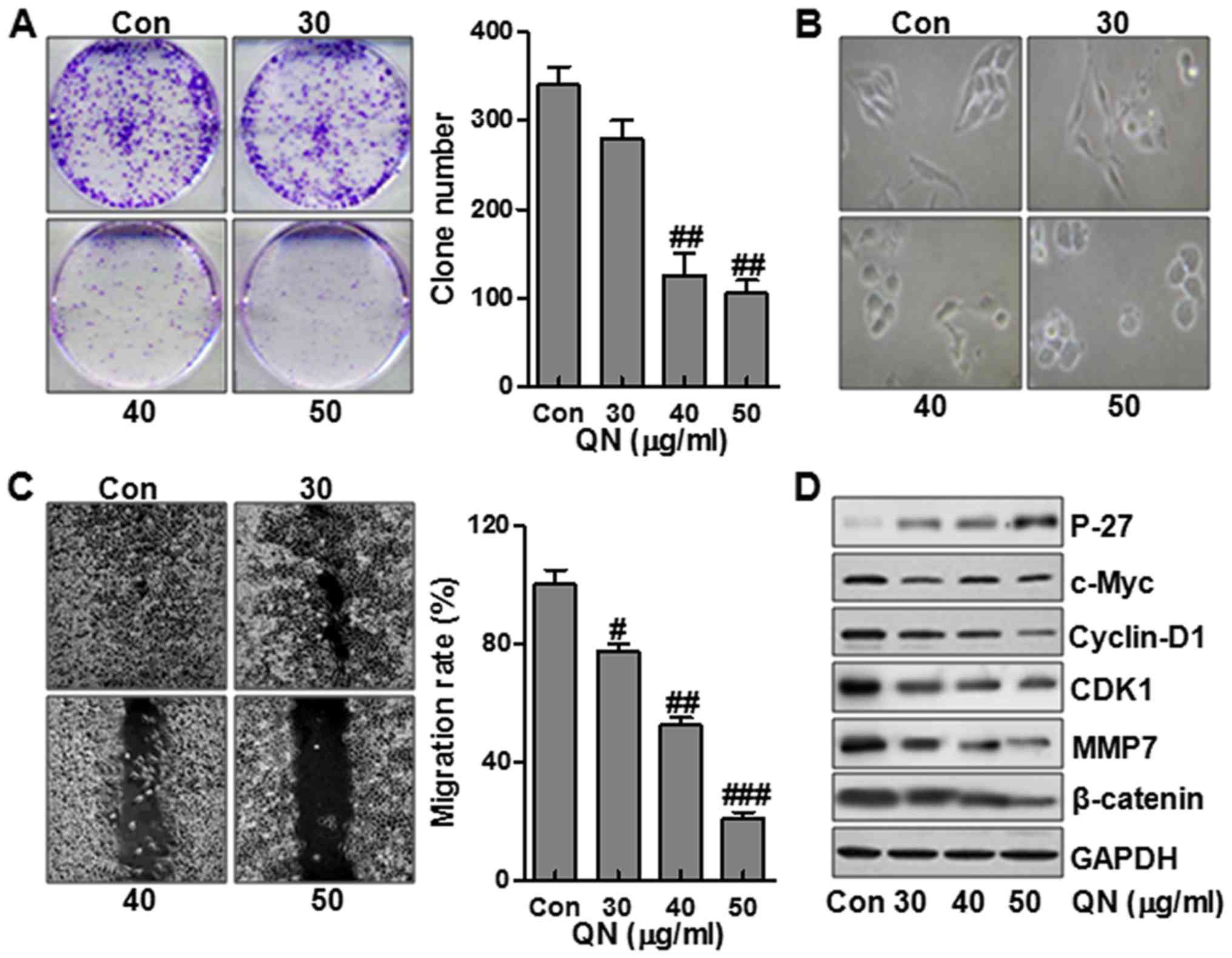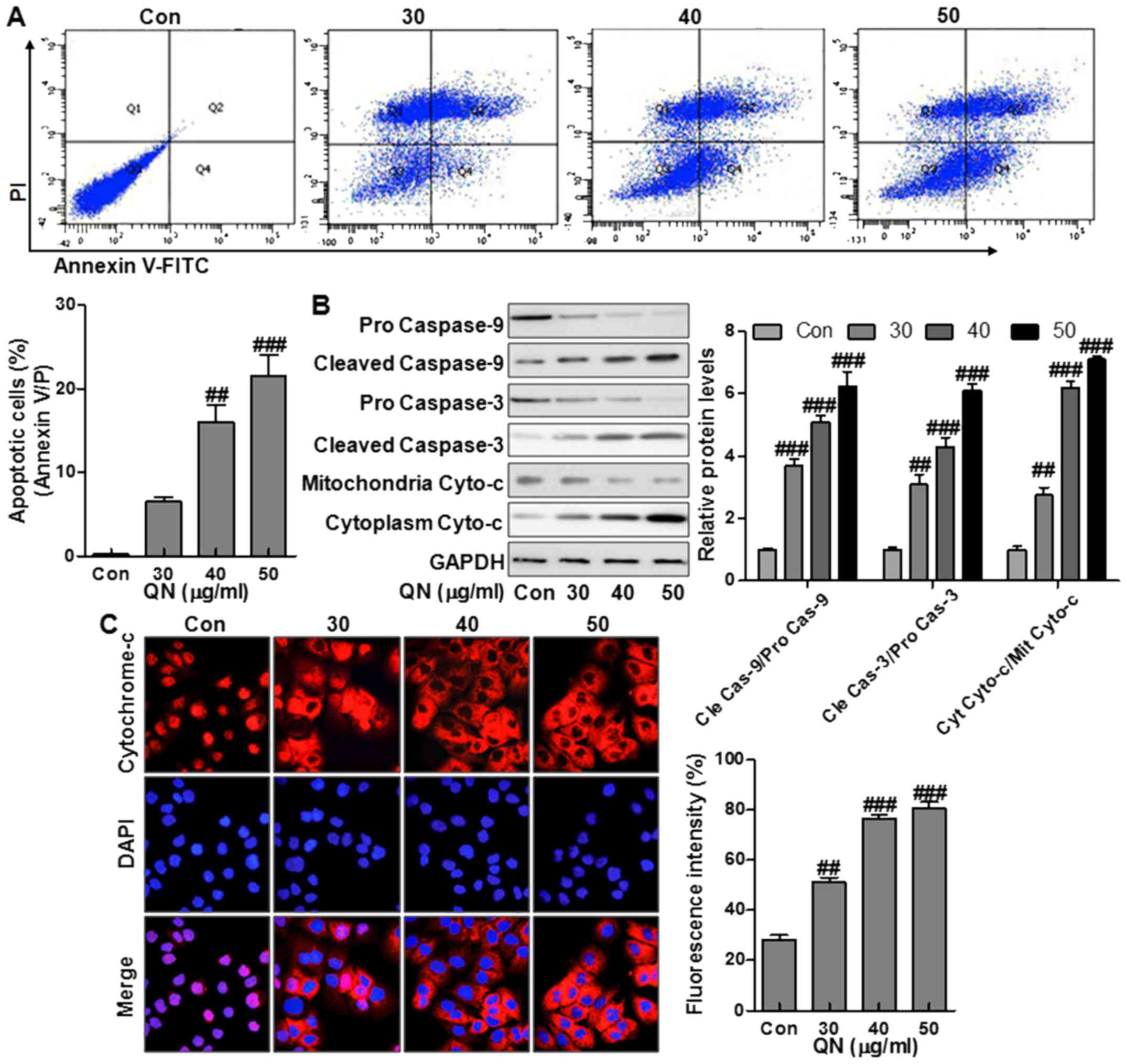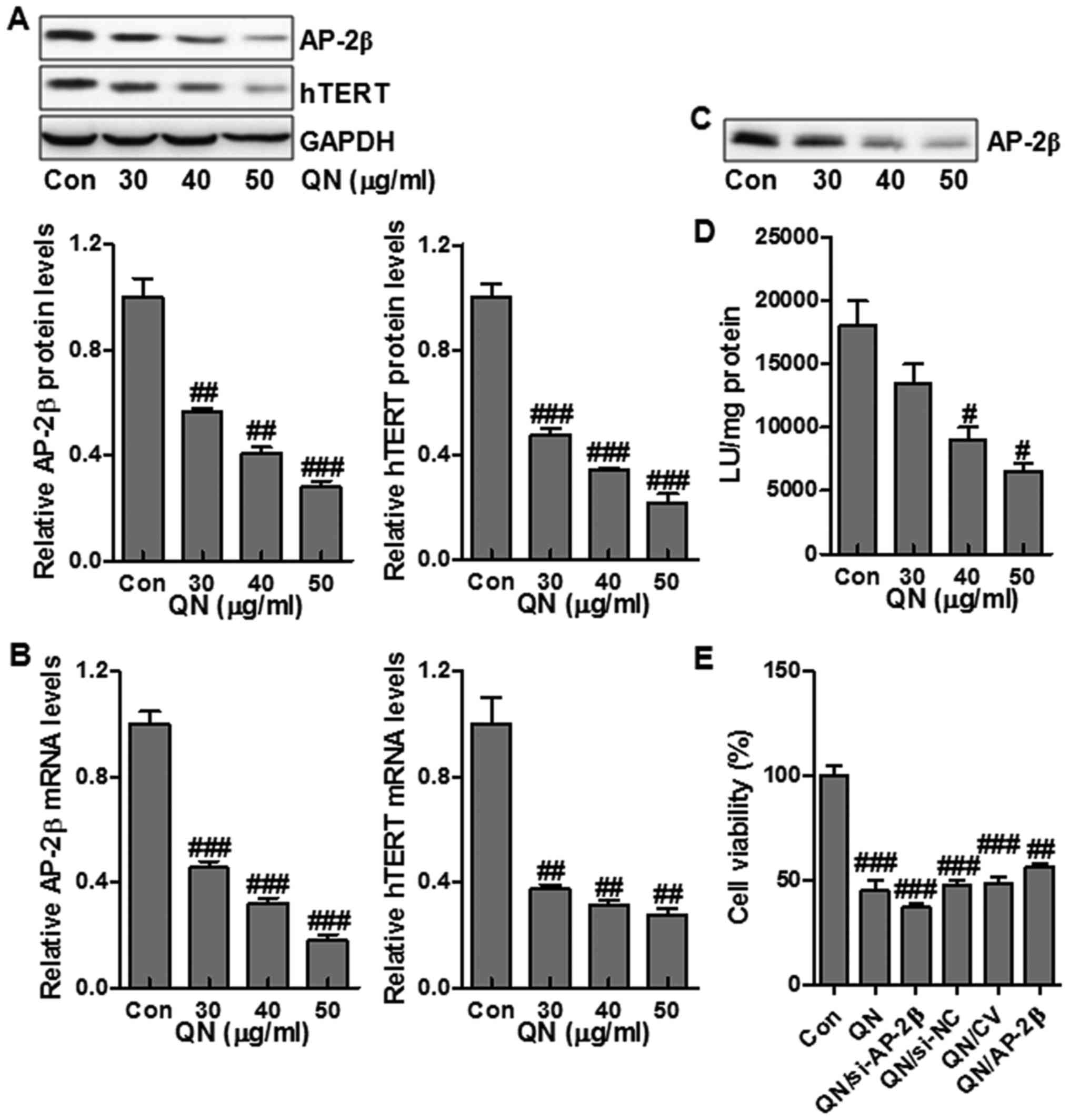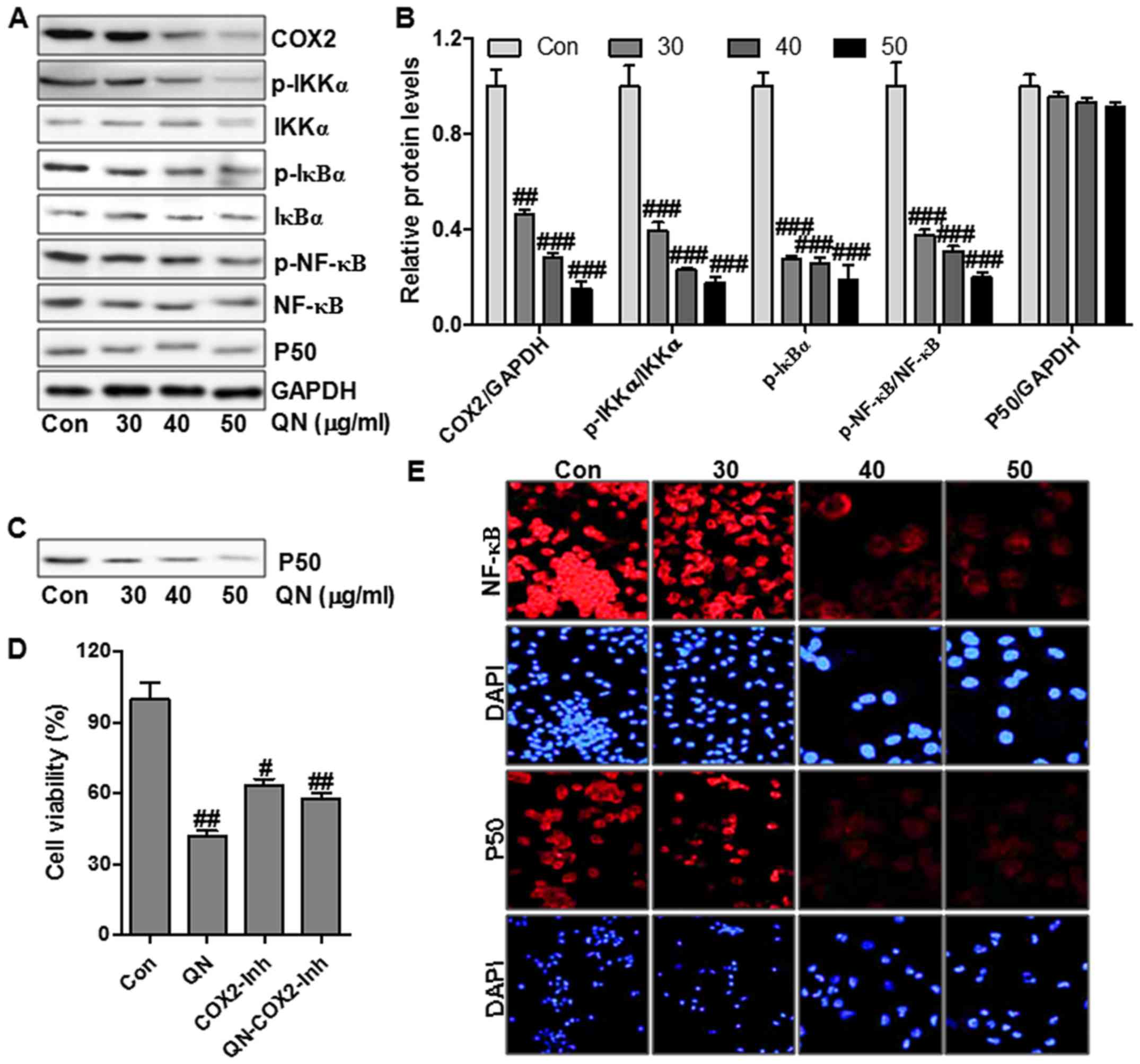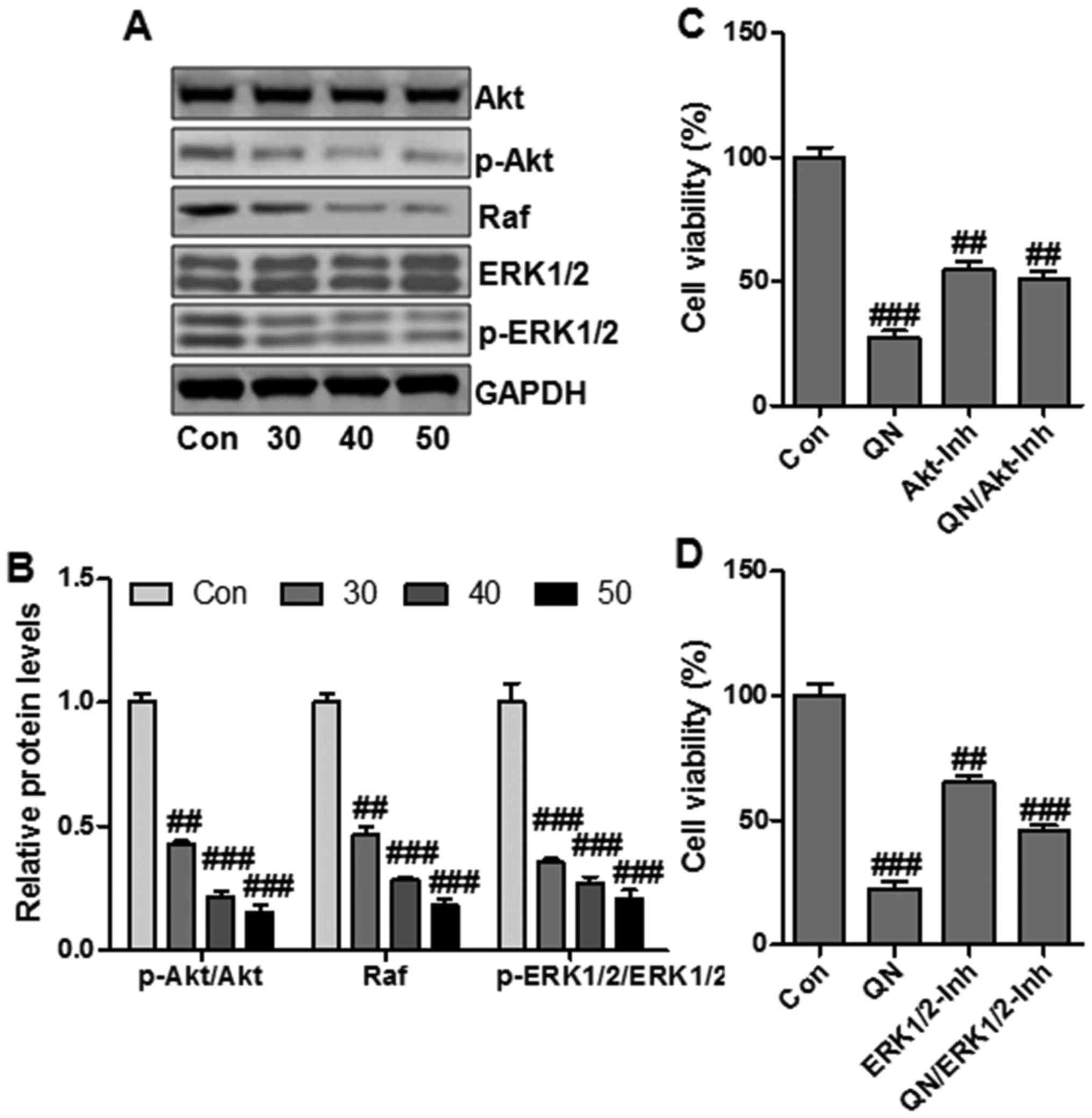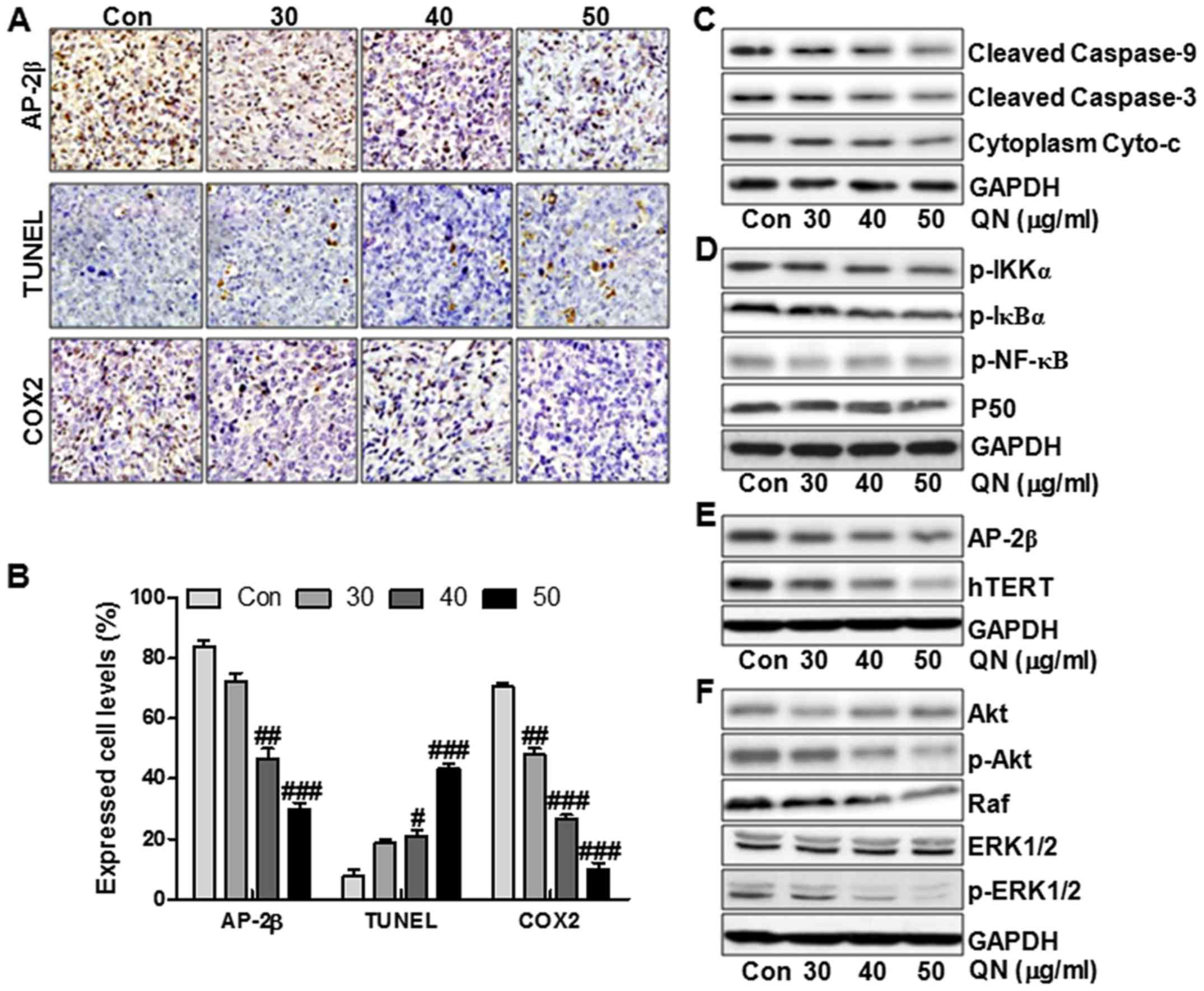|
1
|
Marquardt JU, Andersen JB and Thorgeirsson
SS: Functional and genetic deconstruction of the cellular origin in
liver cancer. Nat Rev Cancer. 15:653–667. 2015. View Article : Google Scholar : PubMed/NCBI
|
|
2
|
Torre LA, Bray F, Siegel RL, Ferlay J,
Lortet-Tieulent J and Jemal A: Global cancer statistics, 2012. CA
Cancer J Clin. 65:87–108. 2015. View Article : Google Scholar : PubMed/NCBI
|
|
3
|
Chatterjee R and Mitra A: An overview of
effective therapies and recent advances in biomarkers for chronic
liver diseases and associated liver cancer. Int Immunopharmacol.
24:335–345. 2015. View Article : Google Scholar : PubMed/NCBI
|
|
4
|
Bruix J, Raoul JL, Sherman M, Mazzaferro
V, Bolondi L, Craxi A, Galle PR, Santoro A, Beaugrand M,
Sangiovanni A, et al: Efficacy and safety of sorafenib in patients
with advanced hepatocellular carcinoma: Subanalyses of a phase III
trial. J Hepatol. 57:821–829. 2012. View Article : Google Scholar : PubMed/NCBI
|
|
5
|
Davis JM, Murphy EA and Carmichael MD:
Effects of the dietary flavonoid quercetin upon performance and
health. Curr Sports Med Rep. 8:206–213. 2009. View Article : Google Scholar : PubMed/NCBI
|
|
6
|
Wiczkowski W, Romaszko J, Bucinski A,
Szawara-Nowak D, Honke J, Zielinski H and Piskula MK: Quercetin
from shallots (Allium cepa L. var. aggregatum) is more bioavailable
than its glucosides. J Nutr. 138:885–888. 2008.PubMed/NCBI
|
|
7
|
Guo Y, Mah E, Davis CG, Jalili T, Ferruzzi
MG, Chun OK and Bruno RS: Dietary fat increases quercetin
bioavailability in overweight adults. Mol Nutr Food Res.
57:896–905. 2013. View Article : Google Scholar : PubMed/NCBI
|
|
8
|
Aguirre L, Arias N, Macarulla MT, Gracia A
and Portillo MP: Beneficial effects of quercetin on obesity and
diabetes. Open Nutraceuticals J. 4:189–198. 2011. View Article : Google Scholar
|
|
9
|
Bhattacharyya SS, Paul S, De A, Das D,
Samadder A, Boujedaini N and Khuda-Bukhsh AR: Poly
(lactide-co-glycolide) acid nanoencapsulation of a synthetic
coumarin: Cytotoxicity and bio-distribution in mice, in cancer cell
line and interaction with calf thymus DNA as target. Toxicol Appl
Pharmacol. 253:270–281. 2011. View Article : Google Scholar : PubMed/NCBI
|
|
10
|
Lee KM, Hwang MK, Lee DE, Lee KW and Lee
HJ: Protective effect of quercetin against arsenite-induced COX-2
expression by targeting PI3K in rat liver epithelial cells. J Agric
Food Chem. 58:5815–5820. 2010. View Article : Google Scholar : PubMed/NCBI
|
|
11
|
Tan J, Wang S, Yang J and Liu Y: Coupled
particulate and continuum model for nanoparticle targeted delivery.
Comput Struc. 122:128–134. 2013. View Article : Google Scholar
|
|
12
|
Wang S, Zhou Y, Tan J, Xu J, Yang J and
Liu Y: Computational modeling of magnetic nanoparticle targeting to
stent surface under high gradient field. Comput Mech. 53:403–412.
2014. View Article : Google Scholar : PubMed/NCBI
|
|
13
|
Puhl AC, Fagundes M, dos Santos KC,
Polikarpov I, das Gracas MF, da Silva F, Fernandes JB, Vieira PC
and Forim MR: Preparation and characterization of polymeric
nanoparticles loaded with the flavonoid luteolin, by using
factorial design. Int J Drug Deliv. 3:683–698. 2011.
|
|
14
|
Pinzón-Daza ML, Campia I, Kopecka J,
Garzón R, Ghigo D and Riganti C: Nanoparticle- and liposome-carried
drugs: New strategies for active targeting and drug delivery across
blood-brain barrier. Curr Drug Metab. 14:625–640. 2013. View Article : Google Scholar : PubMed/NCBI
|
|
15
|
Alvarez-Erviti L, Seow Y, Yin H, Betts C,
Lakhal S and Wood MJ: Delivery of siRNA to the mouse brain by
systemic injection of targeted exosomes. Nat Biotechnol.
29:341–345. 2011. View
Article : Google Scholar : PubMed/NCBI
|
|
16
|
Xie Y, Ye L, Zhang X, Cui W, Lou J, Nagai
T and Hou X: Transport of nerve growth factor encapsulated into
liposomes across the blood-brain barrier: In vitro and in vivo
studies. J Control Release. 105:106–119. 2005. View Article : Google Scholar : PubMed/NCBI
|
|
17
|
Hosta-Rigau L, Schattling P, Teo BM, Lynge
ME and Städler B: Recent progress of liposomes in nanomedicine. J
Mater Chem B Mater Biol Med. 2:6686–6691. 2014. View Article : Google Scholar
|
|
18
|
Sapra P and Allen TM: Ligand-targeted
liposomal anticancer drugs. Prog Lipid Res. 42:439–462. 2003.
View Article : Google Scholar : PubMed/NCBI
|
|
19
|
Zheng YL, Zhang F, Sun B, Du J, Sun C,
Yuan J, Wang Y, Tao L, Kota K, Liu X, et al: Telomerase enzymatic
component hTERT shortens long telomeres in human cells. Cell Cycle.
13:1765–1776. 2014. View
Article : Google Scholar : PubMed/NCBI
|
|
20
|
Kuźbicki Ł, Lange D, Stanek-Widera A and
Chwirot BW: Different expression of cyclooxygenase-2 (COX-2) in
selected nonmelanocytic human cutaneous lesions. Folia Histochem
Cytobiol. 49:381–388. 2011. View Article : Google Scholar
|
|
21
|
Müller-Decker K: Cyclooxygenase-dependent
signaling is causally linked to non-melanoma skin carcinogenesis:
Pharmacological, genetic, and clinical evidence. Cancer Metastasis
Rev. 30:343–361. 2011. View Article : Google Scholar : PubMed/NCBI
|
|
22
|
Han S, Lee JH, Kim C, Nam D, Chung WS, Lee
SG and Ahn KS, Cho SK, Cho M and Ahn KS: Capillarisin inhibits
iNOS, COX-2 expression, and proinflammatory cytokines in
LPS-induced RAW 264.7 macrophages via the suppression of ERK, JNK,
and NF-κB activation. Immunopharmacol Immunotoxicol. 35:34–42.
2013. View Article : Google Scholar
|
|
23
|
Hsiang CY, Lo HY, Huang HC, Li CC, Wu SL
and Ho TY: Ginger extract and zingerone ameliorated trinitrobenzene
sulphonic acid-induced colitis in mice via modulation of nuclear
factor-κB activity and interleukin-1β signalling pathway. Food
Chem. 136:170–177. 2013. View Article : Google Scholar
|
|
24
|
Wang J, Xiao X, Zhang Y, Shi D, Chen W, Fu
L, Liu L, Xie F, Kang T, Huang W, et al: Simultaneous modulation of
COX-2, p300, Akt, and Apaf-1 signaling by melatonin to inhibit
proliferation and induce apoptosis in breast cancer cells. J Pineal
Res. 53:77–90. 2012. View Article : Google Scholar : PubMed/NCBI
|
|
25
|
Tsao R: Chemistry and biochemistry of
dietary polyphenols. Nutrients. 2:1231–1246. 2010. View Article : Google Scholar
|
|
26
|
Dong YS, Wang JL, Feng DY, Qin HZ, Wen H,
Yin ZM, Gao GD and Li C: Protective effect of quercetin against
oxidative stress and brain edema in an experimental rat model of
subarachnoid hemorrhage. Int J Med Sci. 11:282–290. 2014.
View Article : Google Scholar : PubMed/NCBI
|
|
27
|
Kobori M, Takahashi Y, Sakurai M, Akimoto
Y, Tsushida T, Oike H and Ippoushi K: Quercetin suppresses immune
cell accumulation and improves mitochondrial gene expression in
adipose tissue of diet-induced obese mice. Mol Nutr Food Res.
60:300–312. 2016. View Article : Google Scholar
|
|
28
|
Iyer AK, Khaled G, Fang J and Maeda H:
Exploiting the enhanced permeability and retention effect for tumor
targeting. Drug Discov Today. 11:812–818. 2006. View Article : Google Scholar : PubMed/NCBI
|
|
29
|
Cho HJ, Yoon HY, Koo H, Ko SH, Shim JS,
Lee JH, Kim K, Kwon IC and Kim DD: Self-assembled nanoparticles
based on hyaluronic acid-ceramide (HA-CE) and Pluronic®
for tumor-targeted delivery of docetaxel. Biomaterials.
32:7181–7190. 2011. View Article : Google Scholar : PubMed/NCBI
|
|
30
|
Sharma VK, Mishra D, Sharma A and
Srivastava B: Liposomes: Present prospective and future challenges.
Int J Current Pharm Rev Res. 1:6–16. 2010.
|
|
31
|
Barré B and Perkins ND: A cell cycle
regulatory network controlling NF-kappaB subunit activity and
function. EMBO J. 26:4841–4855. 2007. View Article : Google Scholar : PubMed/NCBI
|
|
32
|
Fu Y, Kadioglu O, Wiench B, Wei Z, Gao C,
Luo M, Gu C, Zu Y and Efferth T: Cell cycle arrest and induction of
apoptosis by cajanin stilbene acid from Cajanus cajan in breast
cancer cells. Phytomedicine. 22:462–468. 2015. View Article : Google Scholar : PubMed/NCBI
|
|
33
|
Satyanarayana A, Hilton MB and Kaldis P:
p21 Inhibits Cdk1 in the absence of Cdk2 to maintain the G1/S phase
DNA damage checkpoint. Mol Biol Cell. 19:65–77. 2008. View Article : Google Scholar :
|
|
34
|
Campomenosi P, Monti P, Aprile A,
Abbondandolo A, Frebourg T, Gold B, Crook T, Inga A, Resnick MA,
Iggo R, et al: p53 mutants can often transactivate promoters
containing a p21 but not Bax or PIG3 responsive elements. Oncogene.
20:3573–3579. 2001. View Article : Google Scholar : PubMed/NCBI
|
|
35
|
Chien CS, Shen KH, Huang JS, Ko SC and
Shih YW: Antimetastatic potential of fisetin involves inactivation
of the PI3K/Akt and JNK signaling pathways with downregulation of
MMP-2/9 expressions in prostate cancer PC-3 cells. Mol Cell
Biochem. 333:169–180. 2010. View Article : Google Scholar
|
|
36
|
Chen JS, Wang Q, Fu XH, Huang XH, Chen XL,
Cao LQ, Chen LZ, Tan HX, Li W, Bi J, et al: Involvement of
PI3K/PTEN/AKT/mTOR pathway in invasion and metastasis in
hepatocellular carcinoma: Association with MMP-9. Hepatol Res.
39:177–186. 2009. View Article : Google Scholar : PubMed/NCBI
|
|
37
|
Choi SH, Im E, Kang HK, Lee JH, Kwak HS,
Bae YT, Park HJ and Kim ND: Inhibitory effects of costunolide on
the telomerase activity in human breast carcinoma cells. Cancer
Lett. 227:153–162. 2005. View Article : Google Scholar : PubMed/NCBI
|
|
38
|
Kim MO, Moon DO, Kang SH, Heo MS, Choi YH,
Jung JH, Lee JD and Kim GY: Pectenotoxin-2 represses telomerase
activity in human leukemia cells through suppression of hTERT gene
expression and Akt-dependent hTERT phosphorylation. FEBS Lett.
582:3263–3269. 2008. View Article : Google Scholar : PubMed/NCBI
|
|
39
|
Di Stefano AL, Enciso-Mora V, Marie Y,
Desestret V, Labussière M, Boisselier B, Mokhtari K, Idbaih A,
Hoang-Xuan K, Delattre JY, et al: Association between glioma
susceptibility loci and tumour pathology defines specific molecular
etiologies. Neurooncol. 15:542–547. 2013.
|
|
40
|
Deng WG, Jayachandran G, Wu G, Xu K, Roth
JA and Ji L: Tumor-specific activation of human telomerase reverses
transcriptase promoter activity by activating enhancer-binding
protein-2beta in human lung cancer cells. J Biol Chem.
282:26460–26470. 2007. View Article : Google Scholar : PubMed/NCBI
|
|
41
|
Kajita S, Ruebel KH, Casey MB, Nakamura N
and Lloyd RV: Role of COX-2, thromboxane A2 synthase, and
prostaglandin I2 synthase in papillary thyroid carcinoma growth.
Mod Pathol. 18:221–227. 2005. View Article : Google Scholar
|
|
42
|
Wang D and Dubois RN: The role of COX-2 in
intestinal inflammation and colorectal cancer. Oncogene.
29:781–788. 2010. View Article : Google Scholar
|
|
43
|
Deng WG, Zhu Y and Wu KK: Role of p300 and
PCAF in regulating cyclooxygenase-2 promoter activation by
inflammatory mediators. Blood. 103:2135–2142. 2004. View Article : Google Scholar
|
|
44
|
Fu L, Chen W, Guo W, Wang J, Tian Y, Shi
D, Zhang X, Qiu H, Xiao X, Kang T, et al: Berberine Targets
AP-2/hTERT, NF-κB/COX-2, HIF-1α/VEGF and Cytochrome-c/caspase
signaling to suppress human cancer cell growth. PLoS One.
8:e692402013. View Article : Google Scholar
|















